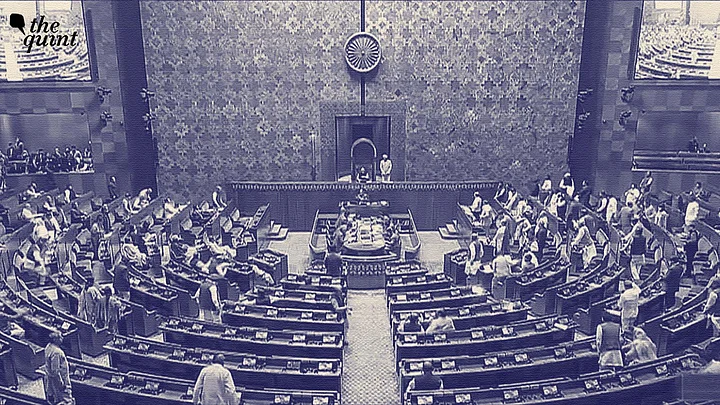William Shakespeare had a unique gift of writing plays that occasionally encapsulated morbid tragedy; and sometimes the comedy of errors and absurd theatrics. Were he covering the Indian Parliament in December 2023, perhaps even he would have been stumped to single out one genre: tragedy, theatrics, or farce? Or a crazy potpourri of all three?
Thinker, scholar, and writer Pratap Bhanu Mehta has been commenting on the ugly underbelly of Indian democracy for decades. He sounds lost and plaintive in a recent op-ed for The Indian Express: “But, in a way, the lack of public outrage on the Bills, or indeed on virtually the entire opposition being suspended, may simply be a function of the fact that there is no appetite for constitutional forms left”.
He is right in pointing out two things. First, that the Narendra Modi regime looks at political discourse as unrestricted and unlimited warfare, and second that it revels in projecting dominance. But Mehta could have added a third point: the seemingly pathetic inability of the opposition to galvanise any kind of public opinion against the perceived authoritarian gestures of this regime.
Strangely, what transpired in the winter session of parliament reminded the author of the Australian cricket team led by Steve Waugh. The great cricketer has admitted that simply winning a test series was not enough for him and his mates. Their single-minded focus was intimidation and the mental destruction of rival teams. Perhaps Narendra Modi and Amit Shah have taken a leaf out of that book.
The Regime Treats the Opposition With Utter Contempt and Disdain
Since Narendra Modi won a historic and bigger repeat mandate in the 2019 Lok Sabha elections, the parliament has been kind of like a circus. A lot of possible “sessions” were lost to COVID. Even otherwise, proceedings have been acrimonious, bitter and hostile. Opposition members have been suspended for “unruly” behaviour. But what happened this time around has been unprecedented. How two youngsters could sneak in canisters of gas inside the parliament and jump into the well of the house from the visitor’s gallery has made a mockery of ITS elaborate security arrangements.
Every sensible Indian is asking: what if the protestors were bent upon causing actual physical damage instead of posturing? After all, it was on 13 December 2001 that Islamist terrorists armed with sophisticated weapons had stormed the parliament, killing nine security personnel and support staff before being neutralised.
The opposition leaders were well within their rights to demand answers from the government. After all, both prime minister Narendra Modi and home minister Amit Shah have admitted that this was a serious matter. The author is no expert on parliamentary procedures, rules, and processes. Yet, common sense says that the heavens would not have fallen if the home minister had formally spoken in both the Lok Sabha and Rajya Sabha. At worst, he would have been heckled with slogans by opposition MPs.
The only reason there was no formal statement could be that the regime treats the opposition with utter contempt and disdain. Perhaps it has been embedded in the mind of the BJP top brass that acquiescing to the opposition's demands would be tantamount to a “political defeat.” In what can only be described as a brute use of force, a total of 146 opposition MPs were suspended from the parliament even as it passed crucial Bills.
The Only Real Victim Has Been the Health of Indian Democracy
If you are not a partisan ideologue, it would be impossible to agree with the government's logic that something had to be done to punish the opposition's MPs whose only intention is to create mayhem and not let Parliament function. At the same time, it would be impossible to even appreciate, forget applaud, the manner in which opposition leaders reacted and behaved after their suspension. At best, it was school boyish. Too much media time has been wasted on political posturing over how opposition MPs insulted the position of the vice-president, the farmers, and the Jats by mimicking and mocking Jagdeep Dhankar.
The problem is not that they indulged in mimicry. The real problem is that their guffaws and laughter sent a clear message to the Indian public that they were not taking the matter seriously. If opposition MPs are seen to trivialise and joke about such a serious issue, why would the Indian public take them seriously? So Mehta is right when he says there is virtually no public outrage. But not because Indians have become supine slaves. It is because even if they don’t like the domineering attitude of the ruling, they don’t find the opposition worthy of trust and respect.
The only real victim has been the health of Indian democracy. The manner in which Bills are being passed and laws are being enacted or changed is scandalous.
Ironically, the Bill that got the most “attention” was the one which enables the prime minister, a cabinet minister and the leader of opposition, to appoint members of the Election Commission. There has been wailing about how this means there will be no more “free and fair” elections. That is nonsense because the government has always appointed members of the ECI since 1950 and elections have been universally acknowledged to be free and fair, barring minor hiccups.
The really important Bills were the Telecom Bill and the three criminal law Bills that have completely overhauled the criminal justice system. These new laws will directly impact 1.4 billion Indians. And yet, they were passed without any proper debate and discussion. Both the ruling coalition and the opposition need to share the blame for making a mockery of Parliament.
(Sutanu Guru is the Executive Director of the CVoter Foundation. This is an opinion article and the views expressed above are the author’s own. The Quint neither endorses nor is responsible for them.)
(At The Quint, we question everything. Play an active role in shaping our journalism by becoming a member today.)
